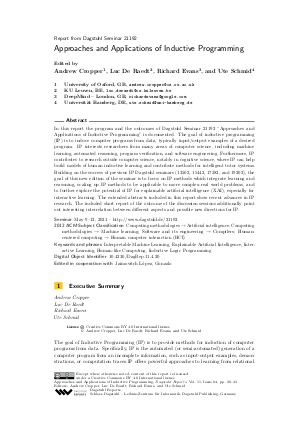Approaches and Applications of Inductive Programming (Dagstuhl Seminar 21192)
Authors Andrew Cropper, Luc De Raedt, Richard Evans, Ute Schmid and all authors of the abstracts in this report
-
Part of:
Issue:
Dagstuhl Reports, Volume 11, Issue 4
Part of: Volume: Dagstuhl Reports, Volume 11
Part of: Journal: Dagstuhl Reports (DagRep) - License:
 Creative Commons Attribution 4.0 International license
Creative Commons Attribution 4.0 International license
- Publication Date: 2021-09-16
File

PDF
DagRep.11.4.20.pdf
- Filesize: 1.81 MB
- 14 pages
Document Identifiers
Subject Classification
ACM Subject Classification
- Computing methodologies → Artificial intelligence
- Computing methodologies → Machine learning
- Software and its engineering → Compilers
- Human-centered computing → Human computer interaction (HCI)
Keywords
- Interpretable Machine Learning
- Explainable Artificial Intelligence
- Interactive Learning
- Human-like Computing
- Inductive Logic Programming
Metrics
- Access Statistics
-
Total Accesses (updated on a weekly basis)
0PDF Downloads0Metadata Views
Abstract
In this report the program and the outcomes of Dagstuhl Seminar 21192 "Approaches and Applications of Inductive Programming" is documented. The goal of inductive programming (IP) is to induce computer programs from data, typically input/output examples of a desired program. IP interests researchers from many areas of computer science, including machine learning, automated reasoning, program verification, and software engineering. Furthermore, IP contributes to research outside computer science, notably in cognitive science, where IP can help build models of human inductive learning and contribute methods for intelligent tutor systems. Building on the success of previous IP Dagstuhl seminars (13502, 15442, 17382, and 19202), the goal of this new edition of the seminar is to focus on IP methods which integrate learning and reasoning, scaling up IP methods to be applicable to more complex real world problems, and to further explore the potential of IP for explainable artificial intelligence (XAI), especially for interactive learning. The extended abstracts included in this report show recent advances in IP research. The included short report of the outcome of the discussion sessions additionally point out interesting interrelation between different aspects and possible new directions for IP.
Cite As Get BibTex
Andrew Cropper, Luc De Raedt, Richard Evans, and Ute Schmid. Approaches and Applications of Inductive Programming (Dagstuhl Seminar 21192). In Dagstuhl Reports, Volume 11, Issue 4, pp. 20-33, Schloss Dagstuhl – Leibniz-Zentrum für Informatik (2021)
https://doi.org/10.4230/DagRep.11.4.20
BibTex
@Article{cropper_et_al:DagRep.11.4.20,
author = {Cropper, Andrew and De Raedt, Luc and Evans, Richard and Schmid, Ute},
title = {{Approaches and Applications of Inductive Programming (Dagstuhl Seminar 21192)}},
pages = {20--33},
journal = {Dagstuhl Reports},
ISSN = {2192-5283},
year = {2021},
volume = {11},
number = {4},
editor = {Cropper, Andrew and De Raedt, Luc and Evans, Richard and Schmid, Ute},
publisher = {Schloss Dagstuhl -- Leibniz-Zentrum f{\"u}r Informatik},
address = {Dagstuhl, Germany},
URL = {https://drops.dagstuhl.de/entities/document/10.4230/DagRep.11.4.20},
URN = {urn:nbn:de:0030-drops-147975},
doi = {10.4230/DagRep.11.4.20},
annote = {Keywords: Interpretable Machine Learning, Explainable Artificial Intelligence, Interactive Learning, Human-like Computing, Inductive Logic Programming}
}
